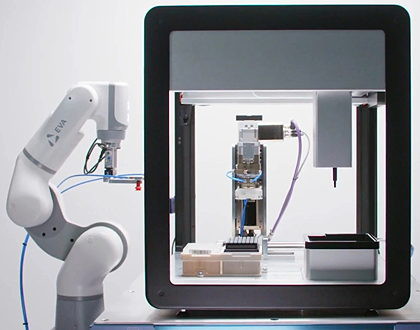UK cobot-maker raises $50m to target lab automation

The UK robot and laboratory automation developer Automata has raised $50m in Series B funding which it will use to drive the development of its Automata Labs technology for diagnostics, drug discovery and biotech applications. It says that this technology will allow life scientists to save time by scaling capacities, and to spend more time on analytical work – which will, in turn, lead to cost savings.
The investment round has been led by Octopus Ventures with renewed participation from previous investors ABB Technology Ventures, Hummingbird, Latitude Ventures and Isomer Capital, as well as strategic investors including In-Q-Tel.
The new investment follows rapid growth for London-based Automata, whose technologies have been used to conduct nearly a million lab tests in recent months. Its systems have been used by NHS pathology labs to help tackle diagnostic backlogs and to upscale capacities. In one lab, 40 fully automated stations are now running around the clock.
Automata says that scientists using its technology are achieving accurate results faster, and on a larger scale, than was possible before. The company is currently advising and deploying automation with contract research organisations, research labs and blue-chip healthcare institutions.
“I'm really excited at how this funding will take us on the next stage of our successful journey,” says Automata’s CEO and co-founder, Mostafa ElSayed. “At Automata we have always believed in the power of automation to support a variety of uses especially when deployed at scale. We are thrilled to see our users adopt automation at a scale that transforms their ability to deliver more innovation in the life sciences to ultimately accelerate their pursuit of progress.
“For far too long scientists and clinicians have been having to work with overly complex lab solutions,” he adds. “Equipment and software are disjointed and difficult to orchestrate, while solutions are often too rigid and inappropriate for labs with small geographic footprints. Our next-generation technology solves this.”
Automata was founded in 2015 by two architects, ElSayed and Suryansh Chnadra, who had encountered some of the limitations of conventional robots while working for their former employer, Zaha Hadid Architects. They developed a small, low-cost collaborative robot (cobot) called Eva, initially aimed at general-purpose automation duties, especially for smaller companies. The easy-to-program 9.5kg desktop cobot could lift payloads of up to 1.25kg and boasted a repeatability of ±0.5mm. When it reached the market in 2019, the six-axis arm was priced at around £5,000.
The arrival of the Covid-19 pandemic opened up a massive new market for automated laboratory testing. It is estimated that in 2021, the demand and capability for molecular testing in UK pathology microbiology labs jumped from around 300,000 a year to 300,000 every day.
At the height of the pandemic, Automata worked with the University Hospital Southampton (UHS) NHS Foundation Trust to automate Reverse Transcript Loop-mediated isothermal amplification (RT-Lamp) testing. In June 2020, a pilot programme for weekly Covid testing began using an RT-Lamp-based procedure for no-swab saliva testing.
Initially, Automata worked with UHS as a robot supplier, but this grew into a partnership with Automata designing bespoke systems that could be reprogrammed on-site to meet changing requirements.
Automata designed, tested, manufactured and installed an automated liquid-handling system in six months. The system links several modular processing stations via a conveyor belt to form an end-to-end testing line. Each module uses a robot arm to handle saliva samples for processes including testing, sampling, reformatting and reading. The flexibility of the design allowed it to evolve as UHS’ needs changed.

The system has helped UHS to process unprecedented volumes of tests per day, while reducing the risk of human errors. It has also made lab practices safer for staff and avoided potential exposure to biohazardous substances.
The success of the partnership has led Automata and UHS to explore how other manual elements of testing could be automated, and diagnostic processes streamlined.
Automata – which had found that its previous business model of supplying low-cost, general-purpose cobots to individual customers was not viable – decided to focus on the laboratory automation market and in November 2021 announced the launch of Automata Labs, an workflow automation system for life science laboratories.
Previously, says Automata, end-to-end laboratory workflow automation had often been out of reach of laboratories wanting to scale up their capabilities. Equipment and software were often too expensive, while existing technologies were often inappropriate for labs with small footprints.
Automata Labs consists of modular pods containing robot arms that can operate lab equipment. Multiple pods can be integrated and automated simultaneously, minimising the need for manual input. Automata also offers management software and support to provide complete laboratory workflow automation systems.
“Automata identified the life science industry as the sector ripe to feel the benefits of robotic automation,” ElSayed reports. He describes Automata Labs as a “one-stop system to make robotic automation accessible to labs frustrated by the limitations of their own manual environment”.
Automata has also teamed up with Flow Robotics, a Danish specialist in liquid-handling robots, to offer end-to-end automation of liquid handling in laboratories. Automata’s Eva robot can tend Flow Robotics’ pipetting robot, flowbot One, by switching its racks continuously as it performs pipetting tasks, thus allowing lab staff to devote their time to more valuable work.
The new funding for Automata follows an earlier round in 2019 which raised $7.4m. Part of the new funding will help the company to expand internationally.





